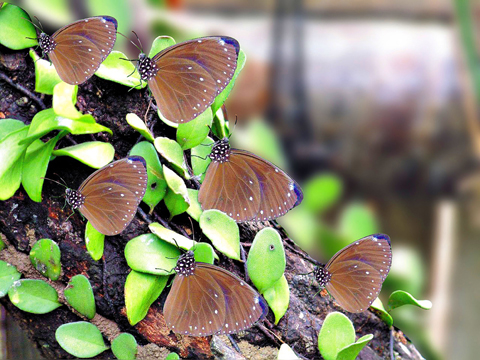Much to wildlife conservationists’ amazement and joy, Taiwan’s largest purple crow butterfly habitat managed to withstand devastation wrought by Typhoon Morakot, which battered southern Taiwan in early August.
“A recent field survey shows that the gorges of Seshe and Maolin Ecological Park in Kaohsiung County’s Maolin National Scenic Area [MNSA] — the traditional winter habitat of the special migrating butterfly species — remained mostly unscathed,” Wu Mao-sheng (吳茂盛), director of MNSA Administration, said on Thursday.
Usually the colorful creatures begin arriving in large numbers in Maolin’s (茂林) valleys in November, but this year, the first ones arrived early last month, Wu said.

PHOTO: LEE WEN-YI, TAIPEI TIMES
“The number of wintering purple crow butterflies is expected to be impressive this year, judging from the fact that the number of those arriving in October far surpassed the figure recorded for the same period of last year,” Wu said.
About 400,000 purple crow butterflies were documented in the Maolin valleys last year, volunteers from the Taiwan Purple Crow Butterfly Ecological Preservation Association said.
With the recent drop in temperature in northern Taiwan, volunteers said they expected more butterflies would come to Maolin for wintering this year and that the number could match the previous high of 1 million.
“Usually, more than 100 butterflies will flutter over one’s head in five minutes,” a volunteer said.
As most of the butterflies rest in higher altitude valleys, tourists can only see scattered butterflies within river valleys during sunny mornings, the volunteer said.
In recent years, the MNSA Administration has regularly organized guided butterfly-watching tours to allow more wildlife enthusiasts to admire the insects close up.
Wu said a biennial butterfly-watching program would run from Dec. 12 to March 6.
Mountainous townships in the region, including Maolin, Liouguei (六龜), Taoyuan (桃源), Sandimen (三地門), Majia (瑪家) and Wutai (霧台), were all severely devastated by flooding and landslides.
After being closed to tourists for three months, major pathways in the region have been repaired and paved with asphalt, Wu said.
“While large coaches will still be barred … medium-sized buses, SUVs and compact cars can cruise the area safely,” Wu said.
As a prelude to the biennial butterfly watching festival, Wu said his office would join forces with the Liouguei township office in organizing a drumming event at the township’s Baolai Junior High School this weekend dedicated to survivors in the region.
U Theatre will head a group of hearing-impaired students in performing its signature drum piece, Mandala Dedication, which was performed at the opening ceremony for the 2009 Summer Deaflympics in Taipei in September.
The program will be named “Drum Wish” as organizers say they hope the sound and rhythm of drumming can encourage typhoon-affected people to regain faith and rebuild their lives and careers.

Aftershocks from a magnitude 6.2 earthquake that struck off Yilan County at 3:45pm yesterday could reach a magnitude of 5 to 5.5, the Central Weather Administration (CWA) said. Seismological Center technical officer Chiu Chun-ta (邱俊達) told a news conference that the epicenter of the temblor was more than 100km from Taiwan. Although predicted to measure between magnitude 5 and 5.5, the aftershocks would reach an intensity of 1 on Taiwan’s 7-tier scale, which gauges the actual effect of an earthquake, he said. The earthquake lasted longer in Taipei because the city is in a basin, he said. The quake’s epicenter was about 128.9km east-southeast

The Taipei Summer Festival is to begin tomorrow at Dadaocheng Wharf (大稻埕), featuring four themed firework shows and five live music performances throughout the month, the Taipei Department of Information and Tourism said today. The festival in the city’s Datong District (大同) is to run until Aug. 30, holding firework displays on Wednesdays and the final Saturday of the event. The first show is scheduled for tomorrow, followed by Aug. 13, 20 and 30. To celebrate the 30th anniversary of Disney Pixar's movie Toy Story, the festival has partnered with Walt Disney Co (Taiwan) to host a special themed area on

BE CAREFUL: The virus rarely causes severe illness or death, but newborns, older people and those with medical conditions are at risk of more severe illness As more than 7,000 cases of chikungunya fever have been reported in China’s Guangdong Province this year, including 2,892 new cases last week, the Centers for Disease Control (CDC) yesterday said it is monitoring the situation and considering raising the travel notice level, which might be announced today. The CDC issued a level 1 travel notice, or “watch,” for Guangdong Province on July 22, citing an outbreak in Foshan, a manufacturing hub in the south of the province, that was reported early last month. Between July 27 and Saturday, the province reported 2,892 new cases of chikungunya, reaching a total of 7,716

The New Taipei City Government today warned about the often-overlooked dangers of playing in water, and recommended safe swimming destinations to cool off from the summer heat. The following locations in the city as safe and fun for those looking to enjoy the water: Chienshuiwan (淺水灣), Baishawan (白沙灣), Jhongjiao Bay (中角灣), Fulong Beach Resort (福隆海水浴場) and Sansia District’s (三峽) Dabao River (大豹溪), New Taipei City Tourism and Travel Department Director-General Yang Tsung-min (楊宗珉) said. Outdoor bodies of water have variables outside of human control, such as changing currents, differing elevations and environmental hazards, all of which can lead to accidents, Yang said. Sudden